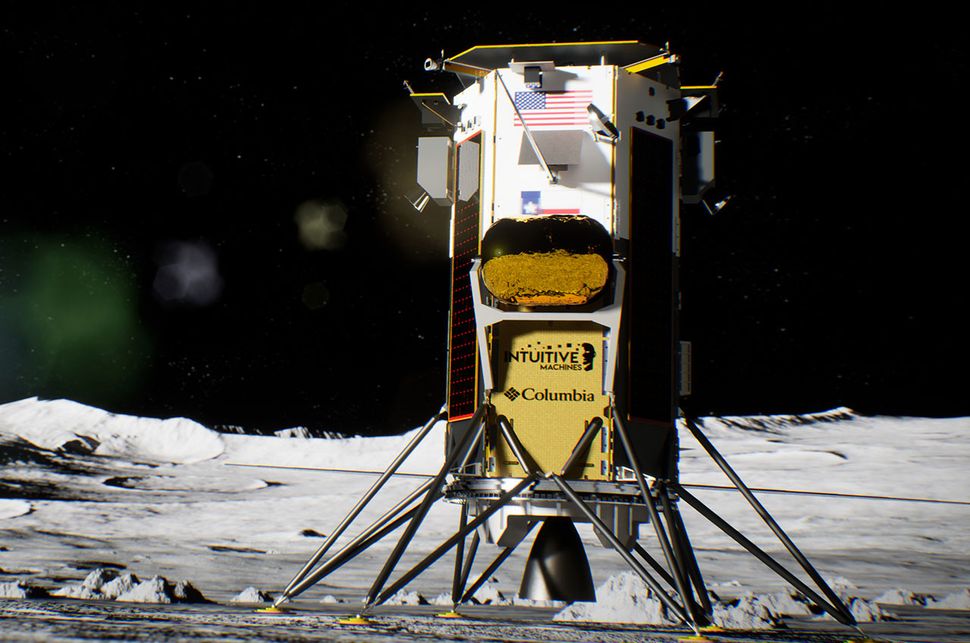The private company Intuitive Machines could soon make history as its commercial lunar lander, Odysseus, will attempt to land near the moon’s south pole on Thursday (Feb. 22).
If successful, the Intuitive Machines lander will become the first-ever private probe to soft-land on the moon and mark the first U.S. landing on the lunar surface since NASA’s Apollo 17 mission achieved the feat in 1972. The mission is carrying a suite of NASA experiments (as part of a $118 million NASA contract) and several commercial payloads for paying customers.
If you’re hoping to watch the historic moon landing attempt live, you’ll need to know when Intuitive Machines hopes to touch down on Feb. 22 — and for that, we’ve got you covered. Here’s what we know about when and how Odysseus will land on the moon.
Related: Intuitive Machines’ private Odysseus probe snaps 1st moon photo
What time will IM-1 Odysseus land on the moon?
Intuitive Machines is currently targeting Thursday (Feb. 22) to land its IM-1 moon lander Odysseus on the lunar surface, with touchdown scheduled to occur no earlier than 5:30 p.m. EST (2230 GMT).
That landing time does depend on several factors, the chief of which is when exactly Odysseus fires its engine to leave lunar orbit and begin its descent. Currently, Odysseus is soaring around the moon in a circular orbit of about 57 miles (92 kilometers).

Just over one hour before landing, Odysseus is scheduled to fire its engine in a Descent Orbit Insertion maneuver designed to put it in an orbit that is 62 miles (100 km) at its highest point and 6 miles (10 km) at its lowest point. That low point should fall right over the landing site if all goes well, according to Intuitive Machines.
During the final descent, Odysseus will use a series of Terrain Relative Navigation cameras and lasers to track its approach to the lunar surface. Its throttled engine will fire continuously to slow its fall by about 1,800 meters per second (4,000 miles per hour) in a maneuver similar to that used by NASA’s Apollo landers, the company said.
After a hard-braking maneuver, Odysseus is designed to eventually slow itself to just 2 mph (1 meter per second) for the final landing.
“Flight controllers expect about a 15-second delay before confirming the ultimate milestone, softly landing on the surface of the moon,” the company wrote in a landing description.
Can you watch Intuitive Machines’ moon landing online?
Yes, you’ll be able to watch the IM-1 Odysseus moon lander touch down live online, thanks to webcasts provided free of charge by NASA and Intuitive Machines.
NASA’s webcast will begin at 4:00 p.m. EST (2100 GMT) and follow the mission during its final approach and landing on the moon. You can tune in via the space agency’s NASA TV channel, NASA+ streaming service and NASA app. You can also follow the mission through updates on NASA’s blog.
Intuitive Machines will livestream the landing on its primary IM-1 mission page, though this webcast is expected to be a simulcast of NASA’s feed.
Space.com will simulcast NASA’s Odysseus moon landing webcast as well, and it will be available at the top of this page at the start time. You can also catch the stream via our YouTube channel.
Where will Odysseus land?
Intuitive Machines’ IM-1 Odysseus spacecraft is targeting a region on the moon called Malapert A, a small crater about 190 miles (300 kilometers) from the lunar south pole.
The crater is about 43 miles (69 km) wide and is a satellite of the larger Malapert Crater nearby. Near Malapert A, there’s also an area called Malapert Massif, a lunar mountain that rises up 16,400 feet (5,000 meters) above its base. This location is on NASA’s shortlist for the Artemis 3 crewed lunar landing mission.
Malapert A is named after the 17th century Belgian astronomer Charles Malapert and is a relatively flat and safe place for Odysseus to land. Intuitive Machines initially targeted an area known as Oceanus Procellarum (or, the Ocean of Storms), but NASA and Intuitive Machines switched targets in May 2023 to better reconnoiter the lunar southern polar region and manage risks for eventual crewed flights.
How long will IM-1 Odysseus survive on the moon?
Intuitive Machines’ Odysseus lander is designed to fly a 16-day mission to the moon, a flight that began with a successful launch atop a SpaceX Falcon 9 rocket on Feb. 15.
After a planned nine-day trip to the moon, Odysseus is expected to last for about seven days on the lunar surface, according to a mission overview. The mission will end once the two-week-long lunar night begins because Odysseus isn’t expected to survive the harsh, cold lunar night.
“Intuitive Machines and its customers expect to conduct science investigations and technology demonstrations for approximately seven days before the lunar night sets on the south pole of the Moon, rendering Odysseus inoperable,” Intuitive Machines wrote in its overview.
Editor’s note: This story was updated at 6:30 p.m. ET on Feb. 21 with the new target landing time of no earlier than 5:30 p.m. ET on Feb. 22.